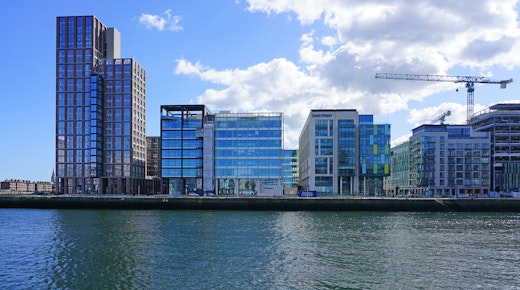Fáilte Ireland consistently monitors hotel markets across the country, the following article provides some common themes and unique characteristics influencing Dublin’s market performance and investment decisions in the sector.
Economic Outlook
The Irish economy continues to expand, and more jobs continue to be added. Inflation has slowed rapidly, and wages are rising in ‘real’ (i.e. inflation adjusted) terms. This will help to underpin consumer spending at home. Global GDP growth is expected to remain stable at c3% per annum over the medium term. While the US election result brings with it some added uncertainly, any negative impact will hinge on what the new regime’s policies do to economic growth and the dollar. Looking at the last time around, from the perspective of Irish tourism, there was steady growth in US trips to Ireland and healthy growth in spending in Ireland.
Dublin hotel performance has recovered
Following an exceptional year for hotel trading performance in 2023, operational performance saw a slowdown in the opening months of 2024. However, YTD September hotel occupancy is clearing 80% across Dublin, a European high and clearly demonstrating a market that has capacity constraints. Compression nights (occupancy >95%) are evident and are mainly being driven by transient leisure demand, particularly around major sporting, entertainment and cultural events. These compression nights are a symptom of supply struggling to meet demand and with dynamic pricing, high-demand nights put strong upward pressure on room rates. Average room rate grew year-on-year from 2019, with a marginal decline in 2024 of c3% YTD September, however still exceeding €180.
Over 75% of room nights in hotels are international, demonstrating the reliance the hotel sector has on the overseas market. The decision on the Dublin airport cap will be critical to future tourism performance. With demand for air travel expected to continue rising and with Dublin being the main access point, a continued cap at Dublin Airport, will have a detrimental impact on Ireland’s ability to grow tourism.
Increasing costs impacting profit
Although rate and occupancy are performing well, concerns remain that rising costs will significantly erode profitability. Rising costs are not easing for the sector, which is highly exposed to cost pressures and recruitment and retention issues. Ireland’s minimum wage rate sits 69% above the EU average in 2023. Wages and salaries in Ireland’s Accommodation and Food sector are, on average 23% higher than the EU average. Higher energy costs, higher food prices, the increase in VAT, increases in financing costs and other input costs are all having an impact on profit conversion.
Rising costs are not easing for the sector, which is highly exposed to cost pressures and recruitment and retention issues.
Dublin’s hotel capacity and pipeline
The National Quality Assurance Framework (NQAF) recorded c63,300 registered bedspaces in Dublin as of Q2 2024, with hotels accounting for 89% of NQAF accommodation supply. The short term lets (STL) stock to Q2 2024 is estimated at 20,200 bedspaces, a market that has experienced significant growth post-pandemic. STL supply varies significantly throughout the year, and based on international evidence, it is likely that STL stock will be impacted by the introduction of the Short-Term Letting Register.
Hosting displaced Ukrainians and others seeking international protection is taking tourist accommodation stock out of the market that would otherwise be available tourism. In Dublin c10% of all Fáilte Ireland registered stock is under contract. This amounts to c6,800 beds with an estimated 9,100 beds under contract in additional unregistered establishments.
As of Q2 2024, c5,050 bedspaces were under construction in Dublin, with c4,050 bedspaces located in Dublin city. Hotels account for the largest share of the construction activity. Dublin will see a number of new hotel brands entering the market to include Courtyard by Marriott, Sofitel, Hilton Home2, Citizen M and Hoxton.
Dublin has approximately 20,400 bedspaces in the pipeline at a ‘plans granted’ stage, however there is no certainty as to how many of these bedspaces will reach practical completion.
Transaction activity has rebounded and the outlook for the investment sector remains solid
Transaction activity within the Irish hotel market has rebounded significantly. In the first three quarters of 2024, sales values reportedly reached €860m. This compares to €350m in 2023. The expectation by year end is sales values of c€1bn.
Investor interest remains high, particularly in Dublin, driven by strong economic activity, the robust occupancy and rate performance and the rise in overseas visitors and domestic trips.
In Dublin, notable transactions include The Shelbourne (c€260m), Radisson Blu Dublin Airport (c€83m), Grand Hotel, Malahide (c€50m), Hard Rock Hotel, Dublin 8 (c€63m), Radisson Blu St Helen’s (c€45m) and The Fleet Hotel, Dublin 2 (c€45m).
The hotel sector – an economic driver
Dublin hotels fill a compelling market need. The economic contribution of accommodation provision in Dublin generates €1.185bn expenditure annually. Nearly 10,000 jobs and €400m in employment income are attributed to the accommodation provision. The hotel industry is an essential economic driver and is responsible for creating jobs, generating tax revenue, stimulating economic activity, promoting sustainability and have a placemaking impact. Hotels are a vital part of Dublin’s infrastructure.





